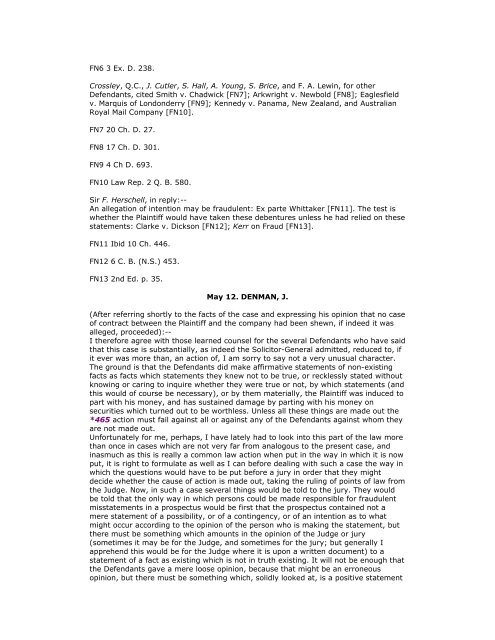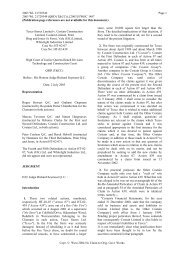FN6 3 Ex. D. 238.Crossley, Q.C., J. Cutler, S. Hall, A. Young, S. Brice, and F. A. Lewin, for otherDefendants, cited Smith v. Chadwick [FN7]; Arkwright v. Newbold [FN8]; Eaglesfieldv. Marquis of Londonderry [FN9]; Kennedy v. Panama, New Zealand, and AustralianRoyal Mail Company [FN10].FN7 20 Ch. D. 27.FN8 17 Ch. D. 301.FN9 4 Ch D. 693.FN10 Law Rep. 2 Q. B. 580.Sir F. Herschell, in reply:--An allegation of intention may be fraudulent: Ex parte Whittaker [FN11]. The test iswhether the Plaintiff would have taken these debentures unless he had relied on thesestatements: Clarke v. Dickson [FN12]; Kerr on Fraud [FN13].FN11 Ibid 10 Ch. 446.FN12 6 C. B. (N.S.) 453.FN13 2nd Ed. p. 35.May 12. DENMAN, J.(After referring shortly to the facts of the case and expressing his opinion that no caseof contract between the Plaintiff and the company had been shewn, if indeed it wasalleged, proceeded):--I therefore agree with those learned counsel for the several Defendants who have saidthat this case is substantially, as indeed the Solicitor-General admitted, reduced to, ifit ever was more than, an action of, I am sorry to say not a very unusual character.The ground is that the Defendants did make affirmative statements of non-existingfacts as facts which statements they knew not to be true, or recklessly stated withoutknowing or caring to inquire whether they were true or not, by which statements (andthis would of course be necessary), or by them materially, the Plaintiff was induced topart with his money, and has sustained damage by parting with his money onsecurities which turned out to be worthless. Unless all these things are made out the*465 action must fail against all or against any of the Defendants against whom theyare not made out.Unfortunately for me, perhaps, I have lately had to look into this part of the law morethan once in cases which are not very far from analogous to the present case, andinasmuch as this is really a common law action when put in the way in which it is nowput, it is right to formulate as well as I can before dealing with such a case the way inwhich the questions would have to be put before a jury in order that they mightdecide whether the cause of action is made out, taking the ruling of points of law fromthe Judge. Now, in such a case several things would be told to the jury. They wouldbe told that the only way in which persons could be made responsible for fraudulentmisstatements in a prospectus would be first that the prospectus contained not amere statement of a possibility, or of a contingency, or of an intention as to whatmight occur according to the opinion of the person who is making the statement, butthere must be something which amounts in the opinion of the Judge or jury(sometimes it may be for the Judge, and sometimes for the jury; but generally Iapprehend this would be for the Judge where it is upon a written document) to astatement of a fact as existing which is not in truth existing. It will not be enough thatthe Defendants gave a mere loose opinion, because that might be an erroneousopinion, but there must be something which, solidly looked at, is a positive statement
of fact. I am putting this, according to my own view of the matter, as a sine quâ non.Next it must be proved that that statement was made fraudulently. Then a jury wouldhave the legal meaning of the word "fraudulently" explained to them, and I take it tobe now established beyond all question that a statement is in the eye of the law madefraudulently not only if the person who makes it is stating something as the fact whichis not the fact--absolutely telling a lie--but less than that suffices in the eye of thelaw. If persons who have the full means of acquiring knowledge about a particularthing, yet with the intention of inducing other people to spend their money upon thatthing, especially on such a venture as a limited company, recklessly, and so to speak,in a gambling spirit, without properly inquiring into the truth or falsehood of the thing,*466 without caring sufficiently whether it is true or false, and will or will not misleadpeople--if such persons wilfully abstain from making inquiries, and make an incorrectstatement about the thing without which the money would not have been advanced,then that is in the eye of the law a fraudulent statement as much as if the personsmaking it had known it to be false. There is, I think, no doubt of the correctness ofthis doctrine, which was stated in the case of Peek v. Gurney [FN14], and has eversince been acted upon by the common law Judges in summing- up to juries. If thestatement is one which is false in this sense, that it is so fragmentary and soimperfect as that it must necessarily lead a person to think that to be the case whichis not the case, that statement does amount sometimes, and may amount--it wouldbe for the jury, and possibly for the Judge, in particular cases to say whether it doesor does not--to a statement fraudulently made within the meaning of those two headsof the definition. Thirdly, a jury would be told that in these cases it must beaffirmatively made out that the Plaintiff was materially--not solely, but materially--influenced in the purchase of the thing which turns out to be useless, or in doing theact which turns out to be disastrous by one or more of the statements so made. Allthose things should be carefully laid down to any jury before they can be left to holdpersons liable upon charges such as these. It is an affirmative case for the Plaintiff tomake out, and any Court, whether it be a Court of Law or Equity, in deciding cases ofthis sort ought to give to itself the same cautions and the same directions as tomatters of this kind, and as to all that is necessary for the foundations of the actions.FN14 Law Rep. 6 H. L. 377.Now with all those conditions before me I have to approach the evidence in thisparticular case, and except as far as the action is against Hunt I think it clear that thePlaintiff's case must stand or fall upon the question whether any or all of thesestatements in the circular were false, and were made either with knowledge that theywere false, or so recklessly as to fall within the rule of fraud arising from that kind ofrecklessness. As to the Defendants, I may say at once that it is hard to see anyreason why any distinction should be drawn between them, saving the cases of *467Clench and Hunt, with whose cases I will deal hereafter. I mean to deal with it as acase in which the question is whether any one of three particular statements, allegedto have been relied on by the Plaintiff, was false, and whether it was false either tothe knowledge of the Defendants, or made so recklessly, without care whether it wastrue or false, as to amount to the same thing. Further, whether it was made in orderto induce people to sub-scribe, and whether in consequence of those statements, orany of them (because one if it did materially induce would be enough), the Plaintiffsubscribed his money to the company and whether he did lose his money thereby.[His Lordship then expressed his opinion that the Plaintiff had not been guilty oflaches, and proceeded:--]Now upon the statements of the circular, I do not think that in cases such as this it isincumbent upon the Court or upon the jury necessarily to look at each statement byitself without regard to the other statements. I think one can easily suggest cases,and that this may be such a cage, in which taking one statement separately youmight say there is nothing in it, or that there is very little in it, or much less thanthere is if you couple it with the other two. In all such cases, in considering theanimus with which the statement was made, I think it is only common sense that,whether jury or Judge, you should look at the whole of the document together, andconsider every statement in it with a view of forming a judgment as to the intention,
















